Cultural Diversity's Impact on Consumer Behavior in UK & Pakistan
VerifiedAdded on 2022/01/18
|9
|3453
|137
Report
AI Summary
This report investigates the influence of cultural diversity on consumer buying behavior in the UK and Pakistan, focusing on how cultural factors shape purchasing decisions during festivals and events. It examines literature on consumer behavior, highlighting the impact of cultural values, social influences, and individual preferences. The report compares consumer trends, online shopping habits, and responses to advertising in both countries, revealing differences in spending patterns, brand loyalty, and the significance of ethical and environmental considerations. The analysis also explores the role of family structures, social status, and reference groups in shaping consumer choices. The report provides a comprehensive overview of the similarities and differences in consumer behavior, offering valuable insights for marketers aiming to understand and target consumers in these diverse cultural contexts. This report also considers the impact of online shopping and the role of social media in influencing consumer choices, as well as the impact of cultural diversity on the purchasing of high-ticket items.
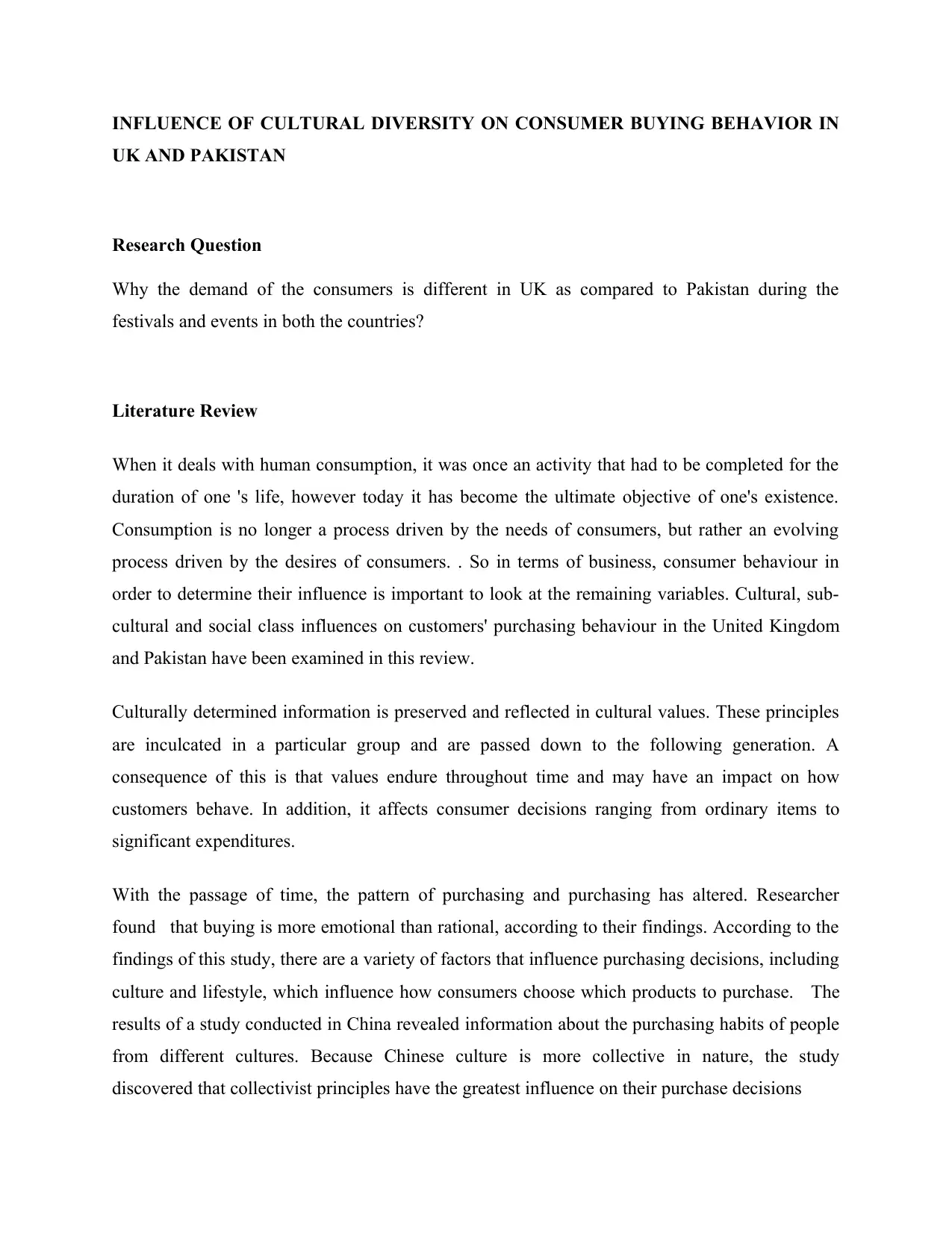
INFLUENCE OF CULTURAL DIVERSITY ON CONSUMER BUYING BEHAVIOR IN
UK AND PAKISTAN
Research Question
Why the demand of the consumers is different in UK as compared to Pakistan during the
festivals and events in both the countries?
Literature Review
When it deals with human consumption, it was once an activity that had to be completed for the
duration of one 's life, however today it has become the ultimate objective of one's existence.
Consumption is no longer a process driven by the needs of consumers, but rather an evolving
process driven by the desires of consumers. . So in terms of business, consumer behaviour in
order to determine their influence is important to look at the remaining variables. Cultural, sub-
cultural and social class influences on customers' purchasing behaviour in the United Kingdom
and Pakistan have been examined in this review.
Culturally determined information is preserved and reflected in cultural values. These principles
are inculcated in a particular group and are passed down to the following generation. A
consequence of this is that values endure throughout time and may have an impact on how
customers behave. In addition, it affects consumer decisions ranging from ordinary items to
significant expenditures.
With the passage of time, the pattern of purchasing and purchasing has altered. Researcher
found that buying is more emotional than rational, according to their findings. According to the
findings of this study, there are a variety of factors that influence purchasing decisions, including
culture and lifestyle, which influence how consumers choose which products to purchase. The
results of a study conducted in China revealed information about the purchasing habits of people
from different cultures. Because Chinese culture is more collective in nature, the study
discovered that collectivist principles have the greatest influence on their purchase decisions
UK AND PAKISTAN
Research Question
Why the demand of the consumers is different in UK as compared to Pakistan during the
festivals and events in both the countries?
Literature Review
When it deals with human consumption, it was once an activity that had to be completed for the
duration of one 's life, however today it has become the ultimate objective of one's existence.
Consumption is no longer a process driven by the needs of consumers, but rather an evolving
process driven by the desires of consumers. . So in terms of business, consumer behaviour in
order to determine their influence is important to look at the remaining variables. Cultural, sub-
cultural and social class influences on customers' purchasing behaviour in the United Kingdom
and Pakistan have been examined in this review.
Culturally determined information is preserved and reflected in cultural values. These principles
are inculcated in a particular group and are passed down to the following generation. A
consequence of this is that values endure throughout time and may have an impact on how
customers behave. In addition, it affects consumer decisions ranging from ordinary items to
significant expenditures.
With the passage of time, the pattern of purchasing and purchasing has altered. Researcher
found that buying is more emotional than rational, according to their findings. According to the
findings of this study, there are a variety of factors that influence purchasing decisions, including
culture and lifestyle, which influence how consumers choose which products to purchase. The
results of a study conducted in China revealed information about the purchasing habits of people
from different cultures. Because Chinese culture is more collective in nature, the study
discovered that collectivist principles have the greatest influence on their purchase decisions
Paraphrase This Document
Need a fresh take? Get an instant paraphrase of this document with our AI Paraphraser
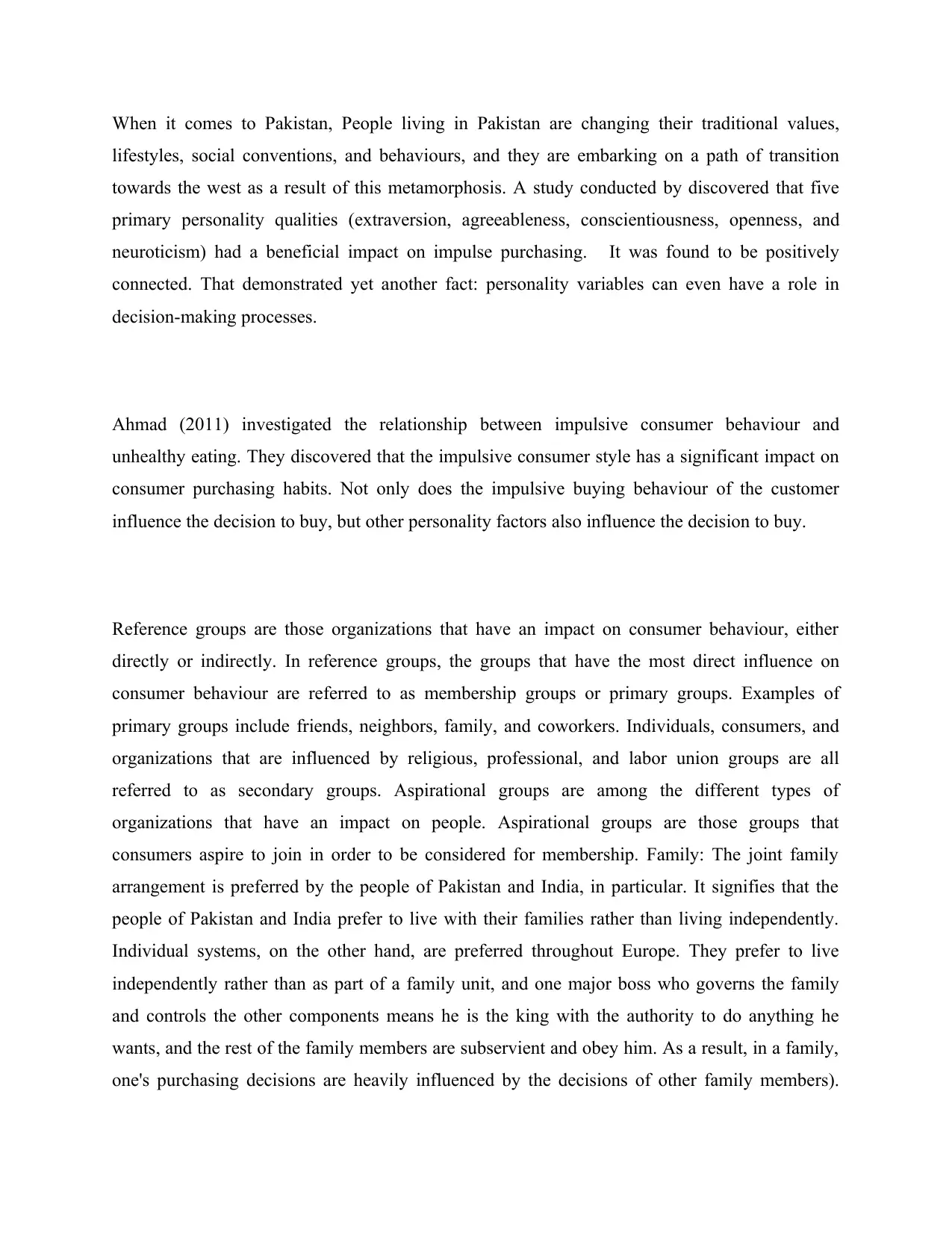
When it comes to Pakistan, People living in Pakistan are changing their traditional values,
lifestyles, social conventions, and behaviours, and they are embarking on a path of transition
towards the west as a result of this metamorphosis. A study conducted by discovered that five
primary personality qualities (extraversion, agreeableness, conscientiousness, openness, and
neuroticism) had a beneficial impact on impulse purchasing. It was found to be positively
connected. That demonstrated yet another fact: personality variables can even have a role in
decision-making processes.
Ahmad (2011) investigated the relationship between impulsive consumer behaviour and
unhealthy eating. They discovered that the impulsive consumer style has a significant impact on
consumer purchasing habits. Not only does the impulsive buying behaviour of the customer
influence the decision to buy, but other personality factors also influence the decision to buy.
Reference groups are those organizations that have an impact on consumer behaviour, either
directly or indirectly. In reference groups, the groups that have the most direct influence on
consumer behaviour are referred to as membership groups or primary groups. Examples of
primary groups include friends, neighbors, family, and coworkers. Individuals, consumers, and
organizations that are influenced by religious, professional, and labor union groups are all
referred to as secondary groups. Aspirational groups are among the different types of
organizations that have an impact on people. Aspirational groups are those groups that
consumers aspire to join in order to be considered for membership. Family: The joint family
arrangement is preferred by the people of Pakistan and India, in particular. It signifies that the
people of Pakistan and India prefer to live with their families rather than living independently.
Individual systems, on the other hand, are preferred throughout Europe. They prefer to live
independently rather than as part of a family unit, and one major boss who governs the family
and controls the other components means he is the king with the authority to do anything he
wants, and the rest of the family members are subservient and obey him. As a result, in a family,
one's purchasing decisions are heavily influenced by the decisions of other family members).
lifestyles, social conventions, and behaviours, and they are embarking on a path of transition
towards the west as a result of this metamorphosis. A study conducted by discovered that five
primary personality qualities (extraversion, agreeableness, conscientiousness, openness, and
neuroticism) had a beneficial impact on impulse purchasing. It was found to be positively
connected. That demonstrated yet another fact: personality variables can even have a role in
decision-making processes.
Ahmad (2011) investigated the relationship between impulsive consumer behaviour and
unhealthy eating. They discovered that the impulsive consumer style has a significant impact on
consumer purchasing habits. Not only does the impulsive buying behaviour of the customer
influence the decision to buy, but other personality factors also influence the decision to buy.
Reference groups are those organizations that have an impact on consumer behaviour, either
directly or indirectly. In reference groups, the groups that have the most direct influence on
consumer behaviour are referred to as membership groups or primary groups. Examples of
primary groups include friends, neighbors, family, and coworkers. Individuals, consumers, and
organizations that are influenced by religious, professional, and labor union groups are all
referred to as secondary groups. Aspirational groups are among the different types of
organizations that have an impact on people. Aspirational groups are those groups that
consumers aspire to join in order to be considered for membership. Family: The joint family
arrangement is preferred by the people of Pakistan and India, in particular. It signifies that the
people of Pakistan and India prefer to live with their families rather than living independently.
Individual systems, on the other hand, are preferred throughout Europe. They prefer to live
independently rather than as part of a family unit, and one major boss who governs the family
and controls the other components means he is the king with the authority to do anything he
wants, and the rest of the family members are subservient and obey him. As a result, in a family,
one's purchasing decisions are heavily influenced by the decisions of other family members).
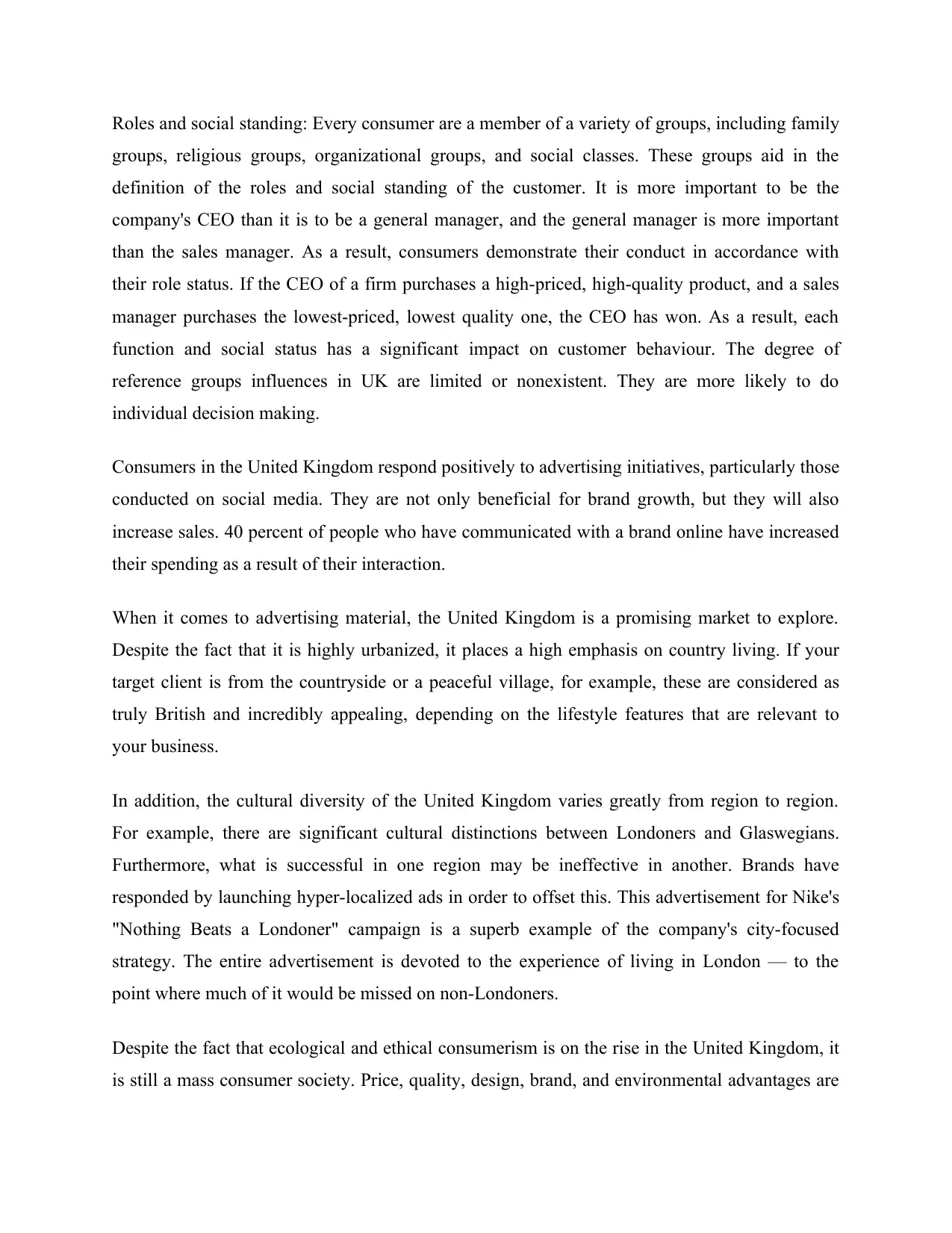
Roles and social standing: Every consumer are a member of a variety of groups, including family
groups, religious groups, organizational groups, and social classes. These groups aid in the
definition of the roles and social standing of the customer. It is more important to be the
company's CEO than it is to be a general manager, and the general manager is more important
than the sales manager. As a result, consumers demonstrate their conduct in accordance with
their role status. If the CEO of a firm purchases a high-priced, high-quality product, and a sales
manager purchases the lowest-priced, lowest quality one, the CEO has won. As a result, each
function and social status has a significant impact on customer behaviour. The degree of
reference groups influences in UK are limited or nonexistent. They are more likely to do
individual decision making.
Consumers in the United Kingdom respond positively to advertising initiatives, particularly those
conducted on social media. They are not only beneficial for brand growth, but they will also
increase sales. 40 percent of people who have communicated with a brand online have increased
their spending as a result of their interaction.
When it comes to advertising material, the United Kingdom is a promising market to explore.
Despite the fact that it is highly urbanized, it places a high emphasis on country living. If your
target client is from the countryside or a peaceful village, for example, these are considered as
truly British and incredibly appealing, depending on the lifestyle features that are relevant to
your business.
In addition, the cultural diversity of the United Kingdom varies greatly from region to region.
For example, there are significant cultural distinctions between Londoners and Glaswegians.
Furthermore, what is successful in one region may be ineffective in another. Brands have
responded by launching hyper-localized ads in order to offset this. This advertisement for Nike's
"Nothing Beats a Londoner" campaign is a superb example of the company's city-focused
strategy. The entire advertisement is devoted to the experience of living in London — to the
point where much of it would be missed on non-Londoners.
Despite the fact that ecological and ethical consumerism is on the rise in the United Kingdom, it
is still a mass consumer society. Price, quality, design, brand, and environmental advantages are
groups, religious groups, organizational groups, and social classes. These groups aid in the
definition of the roles and social standing of the customer. It is more important to be the
company's CEO than it is to be a general manager, and the general manager is more important
than the sales manager. As a result, consumers demonstrate their conduct in accordance with
their role status. If the CEO of a firm purchases a high-priced, high-quality product, and a sales
manager purchases the lowest-priced, lowest quality one, the CEO has won. As a result, each
function and social status has a significant impact on customer behaviour. The degree of
reference groups influences in UK are limited or nonexistent. They are more likely to do
individual decision making.
Consumers in the United Kingdom respond positively to advertising initiatives, particularly those
conducted on social media. They are not only beneficial for brand growth, but they will also
increase sales. 40 percent of people who have communicated with a brand online have increased
their spending as a result of their interaction.
When it comes to advertising material, the United Kingdom is a promising market to explore.
Despite the fact that it is highly urbanized, it places a high emphasis on country living. If your
target client is from the countryside or a peaceful village, for example, these are considered as
truly British and incredibly appealing, depending on the lifestyle features that are relevant to
your business.
In addition, the cultural diversity of the United Kingdom varies greatly from region to region.
For example, there are significant cultural distinctions between Londoners and Glaswegians.
Furthermore, what is successful in one region may be ineffective in another. Brands have
responded by launching hyper-localized ads in order to offset this. This advertisement for Nike's
"Nothing Beats a Londoner" campaign is a superb example of the company's city-focused
strategy. The entire advertisement is devoted to the experience of living in London — to the
point where much of it would be missed on non-Londoners.
Despite the fact that ecological and ethical consumerism is on the rise in the United Kingdom, it
is still a mass consumer society. Price, quality, design, brand, and environmental advantages are
⊘ This is a preview!⊘
Do you want full access?
Subscribe today to unlock all pages.

Trusted by 1+ million students worldwide
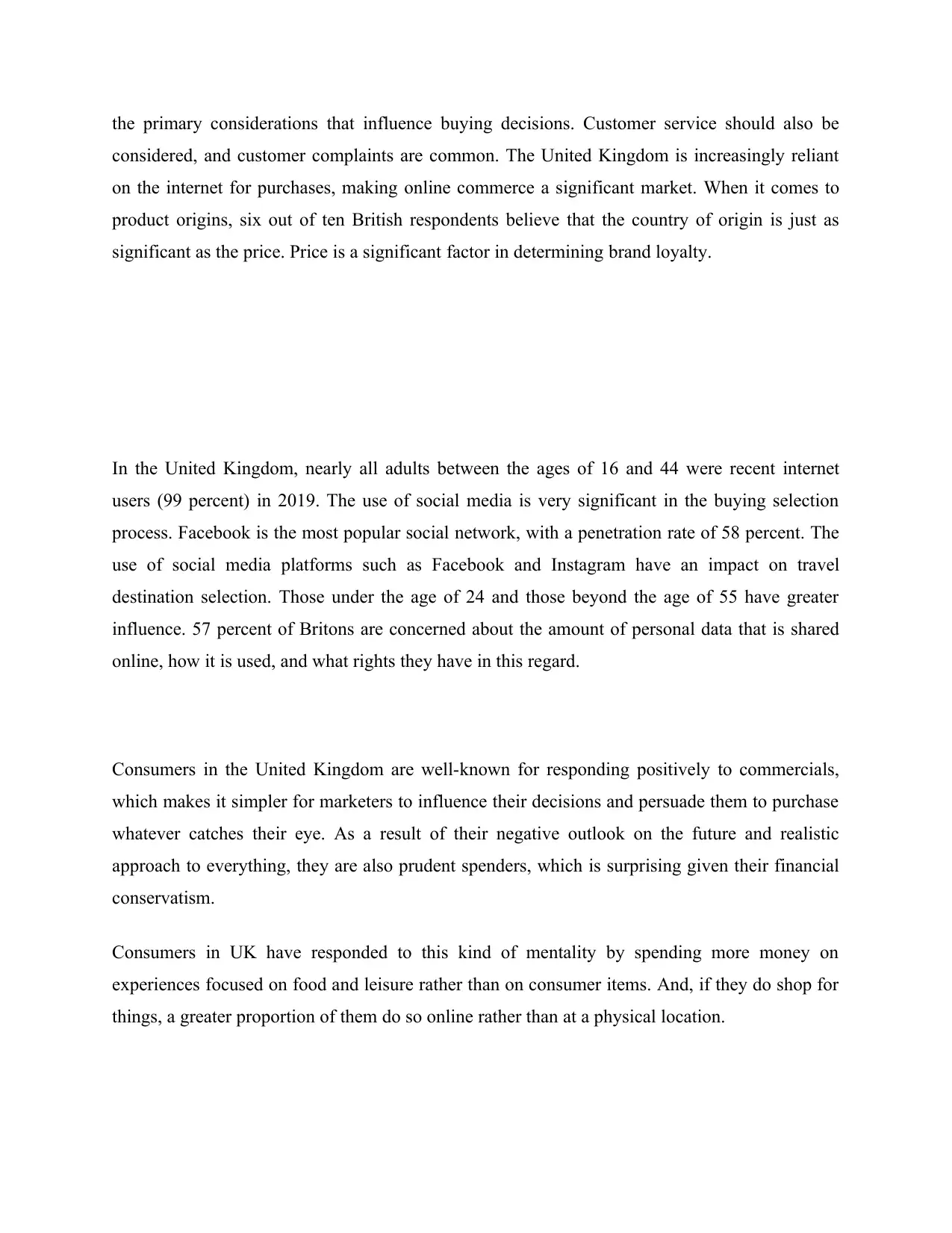
the primary considerations that influence buying decisions. Customer service should also be
considered, and customer complaints are common. The United Kingdom is increasingly reliant
on the internet for purchases, making online commerce a significant market. When it comes to
product origins, six out of ten British respondents believe that the country of origin is just as
significant as the price. Price is a significant factor in determining brand loyalty.
In the United Kingdom, nearly all adults between the ages of 16 and 44 were recent internet
users (99 percent) in 2019. The use of social media is very significant in the buying selection
process. Facebook is the most popular social network, with a penetration rate of 58 percent. The
use of social media platforms such as Facebook and Instagram have an impact on travel
destination selection. Those under the age of 24 and those beyond the age of 55 have greater
influence. 57 percent of Britons are concerned about the amount of personal data that is shared
online, how it is used, and what rights they have in this regard.
Consumers in the United Kingdom are well-known for responding positively to commercials,
which makes it simpler for marketers to influence their decisions and persuade them to purchase
whatever catches their eye. As a result of their negative outlook on the future and realistic
approach to everything, they are also prudent spenders, which is surprising given their financial
conservatism.
Consumers in UK have responded to this kind of mentality by spending more money on
experiences focused on food and leisure rather than on consumer items. And, if they do shop for
things, a greater proportion of them do so online rather than at a physical location.
considered, and customer complaints are common. The United Kingdom is increasingly reliant
on the internet for purchases, making online commerce a significant market. When it comes to
product origins, six out of ten British respondents believe that the country of origin is just as
significant as the price. Price is a significant factor in determining brand loyalty.
In the United Kingdom, nearly all adults between the ages of 16 and 44 were recent internet
users (99 percent) in 2019. The use of social media is very significant in the buying selection
process. Facebook is the most popular social network, with a penetration rate of 58 percent. The
use of social media platforms such as Facebook and Instagram have an impact on travel
destination selection. Those under the age of 24 and those beyond the age of 55 have greater
influence. 57 percent of Britons are concerned about the amount of personal data that is shared
online, how it is used, and what rights they have in this regard.
Consumers in the United Kingdom are well-known for responding positively to commercials,
which makes it simpler for marketers to influence their decisions and persuade them to purchase
whatever catches their eye. As a result of their negative outlook on the future and realistic
approach to everything, they are also prudent spenders, which is surprising given their financial
conservatism.
Consumers in UK have responded to this kind of mentality by spending more money on
experiences focused on food and leisure rather than on consumer items. And, if they do shop for
things, a greater proportion of them do so online rather than at a physical location.
Paraphrase This Document
Need a fresh take? Get an instant paraphrase of this document with our AI Paraphraser
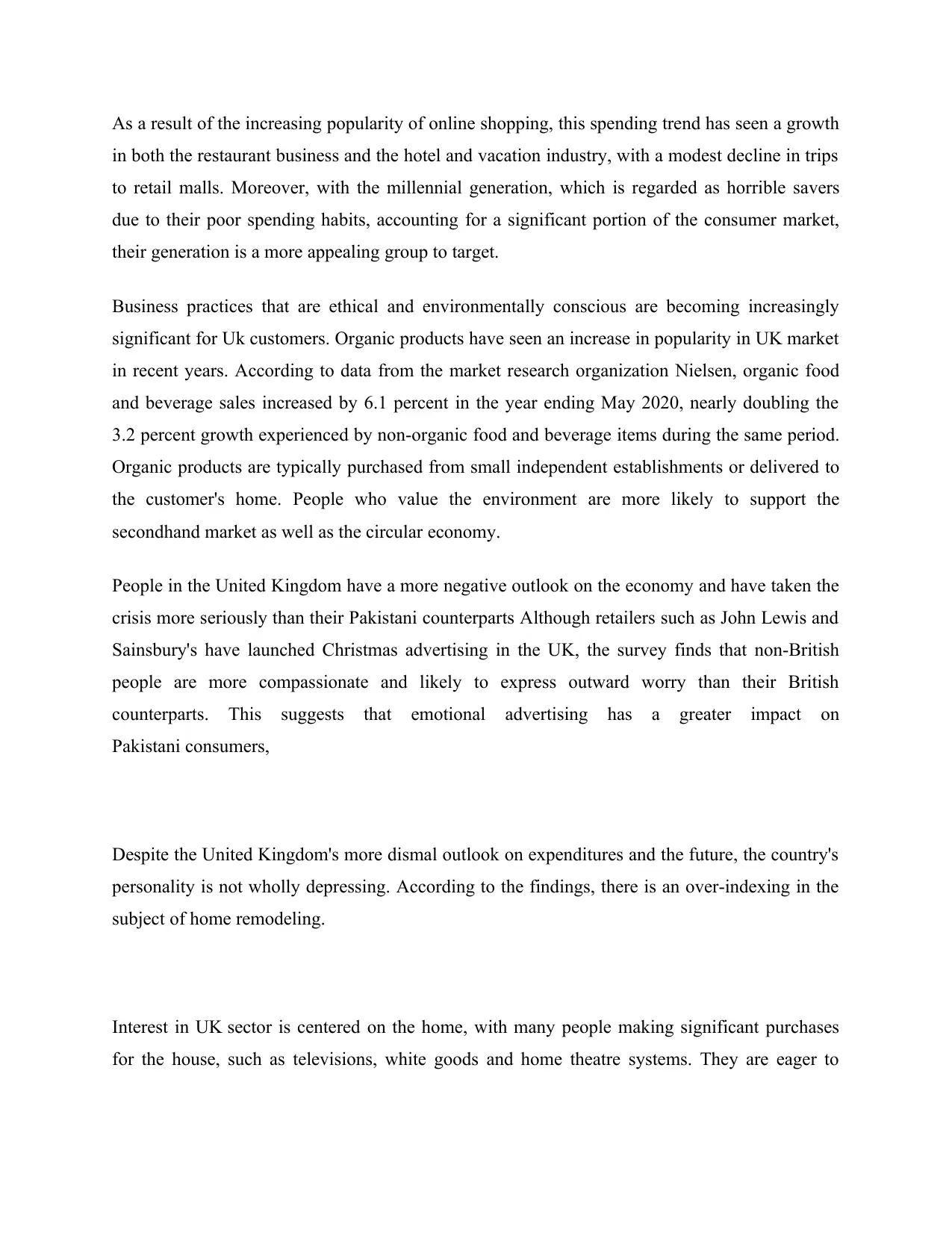
As a result of the increasing popularity of online shopping, this spending trend has seen a growth
in both the restaurant business and the hotel and vacation industry, with a modest decline in trips
to retail malls. Moreover, with the millennial generation, which is regarded as horrible savers
due to their poor spending habits, accounting for a significant portion of the consumer market,
their generation is a more appealing group to target.
Business practices that are ethical and environmentally conscious are becoming increasingly
significant for Uk customers. Organic products have seen an increase in popularity in UK market
in recent years. According to data from the market research organization Nielsen, organic food
and beverage sales increased by 6.1 percent in the year ending May 2020, nearly doubling the
3.2 percent growth experienced by non-organic food and beverage items during the same period.
Organic products are typically purchased from small independent establishments or delivered to
the customer's home. People who value the environment are more likely to support the
secondhand market as well as the circular economy.
People in the United Kingdom have a more negative outlook on the economy and have taken the
crisis more seriously than their Pakistani counterparts Although retailers such as John Lewis and
Sainsbury's have launched Christmas advertising in the UK, the survey finds that non-British
people are more compassionate and likely to express outward worry than their British
counterparts. This suggests that emotional advertising has a greater impact on
Pakistani consumers,
Despite the United Kingdom's more dismal outlook on expenditures and the future, the country's
personality is not wholly depressing. According to the findings, there is an over-indexing in the
subject of home remodeling.
Interest in UK sector is centered on the home, with many people making significant purchases
for the house, such as televisions, white goods and home theatre systems. They are eager to
in both the restaurant business and the hotel and vacation industry, with a modest decline in trips
to retail malls. Moreover, with the millennial generation, which is regarded as horrible savers
due to their poor spending habits, accounting for a significant portion of the consumer market,
their generation is a more appealing group to target.
Business practices that are ethical and environmentally conscious are becoming increasingly
significant for Uk customers. Organic products have seen an increase in popularity in UK market
in recent years. According to data from the market research organization Nielsen, organic food
and beverage sales increased by 6.1 percent in the year ending May 2020, nearly doubling the
3.2 percent growth experienced by non-organic food and beverage items during the same period.
Organic products are typically purchased from small independent establishments or delivered to
the customer's home. People who value the environment are more likely to support the
secondhand market as well as the circular economy.
People in the United Kingdom have a more negative outlook on the economy and have taken the
crisis more seriously than their Pakistani counterparts Although retailers such as John Lewis and
Sainsbury's have launched Christmas advertising in the UK, the survey finds that non-British
people are more compassionate and likely to express outward worry than their British
counterparts. This suggests that emotional advertising has a greater impact on
Pakistani consumers,
Despite the United Kingdom's more dismal outlook on expenditures and the future, the country's
personality is not wholly depressing. According to the findings, there is an over-indexing in the
subject of home remodeling.
Interest in UK sector is centered on the home, with many people making significant purchases
for the house, such as televisions, white goods and home theatre systems. They are eager to
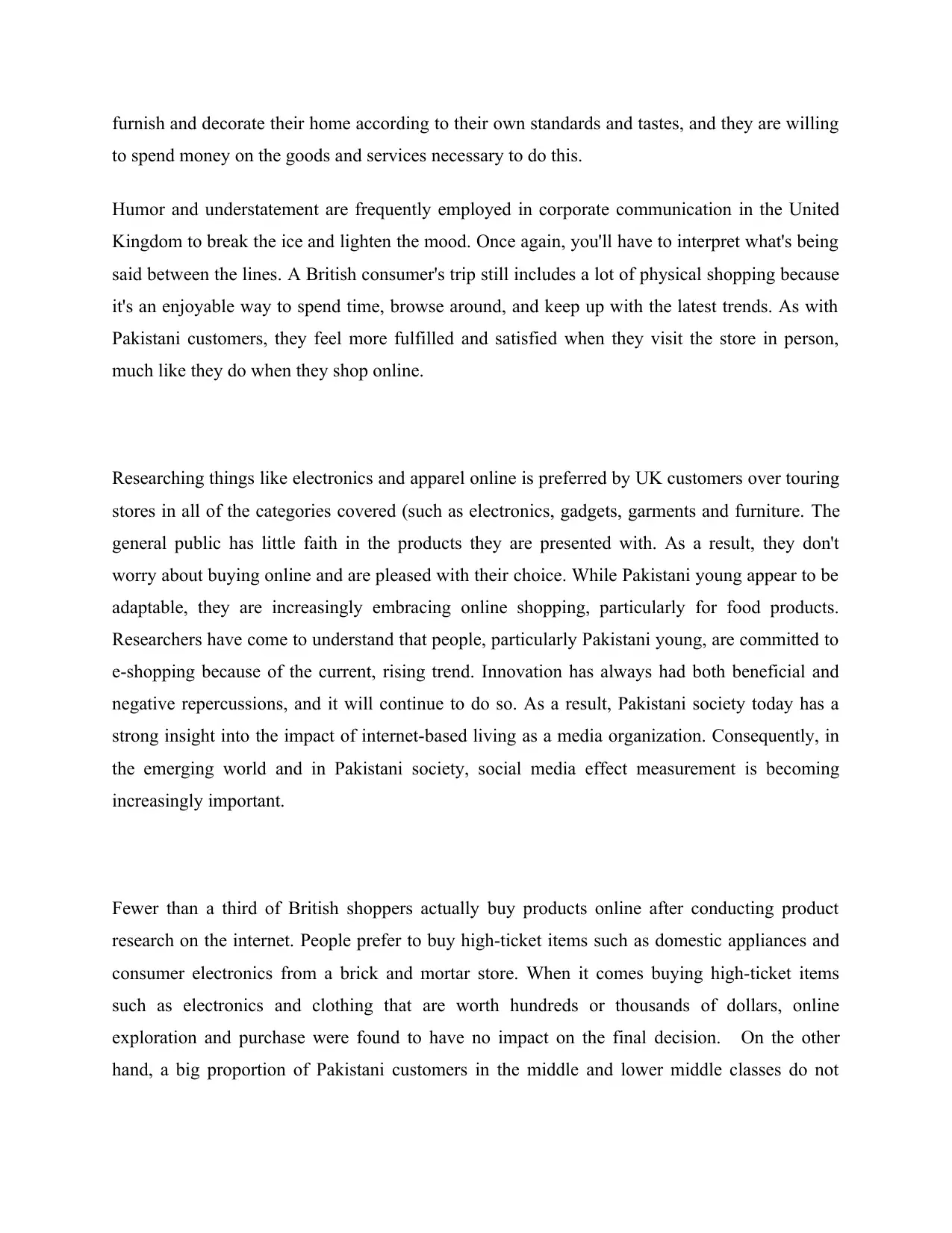
furnish and decorate their home according to their own standards and tastes, and they are willing
to spend money on the goods and services necessary to do this.
Humor and understatement are frequently employed in corporate communication in the United
Kingdom to break the ice and lighten the mood. Once again, you'll have to interpret what's being
said between the lines. A British consumer's trip still includes a lot of physical shopping because
it's an enjoyable way to spend time, browse around, and keep up with the latest trends. As with
Pakistani customers, they feel more fulfilled and satisfied when they visit the store in person,
much like they do when they shop online.
Researching things like electronics and apparel online is preferred by UK customers over touring
stores in all of the categories covered (such as electronics, gadgets, garments and furniture. The
general public has little faith in the products they are presented with. As a result, they don't
worry about buying online and are pleased with their choice. While Pakistani young appear to be
adaptable, they are increasingly embracing online shopping, particularly for food products.
Researchers have come to understand that people, particularly Pakistani young, are committed to
e-shopping because of the current, rising trend. Innovation has always had both beneficial and
negative repercussions, and it will continue to do so. As a result, Pakistani society today has a
strong insight into the impact of internet-based living as a media organization. Consequently, in
the emerging world and in Pakistani society, social media effect measurement is becoming
increasingly important.
Fewer than a third of British shoppers actually buy products online after conducting product
research on the internet. People prefer to buy high-ticket items such as domestic appliances and
consumer electronics from a brick and mortar store. When it comes buying high-ticket items
such as electronics and clothing that are worth hundreds or thousands of dollars, online
exploration and purchase were found to have no impact on the final decision. On the other
hand, a big proportion of Pakistani customers in the middle and lower middle classes do not
to spend money on the goods and services necessary to do this.
Humor and understatement are frequently employed in corporate communication in the United
Kingdom to break the ice and lighten the mood. Once again, you'll have to interpret what's being
said between the lines. A British consumer's trip still includes a lot of physical shopping because
it's an enjoyable way to spend time, browse around, and keep up with the latest trends. As with
Pakistani customers, they feel more fulfilled and satisfied when they visit the store in person,
much like they do when they shop online.
Researching things like electronics and apparel online is preferred by UK customers over touring
stores in all of the categories covered (such as electronics, gadgets, garments and furniture. The
general public has little faith in the products they are presented with. As a result, they don't
worry about buying online and are pleased with their choice. While Pakistani young appear to be
adaptable, they are increasingly embracing online shopping, particularly for food products.
Researchers have come to understand that people, particularly Pakistani young, are committed to
e-shopping because of the current, rising trend. Innovation has always had both beneficial and
negative repercussions, and it will continue to do so. As a result, Pakistani society today has a
strong insight into the impact of internet-based living as a media organization. Consequently, in
the emerging world and in Pakistani society, social media effect measurement is becoming
increasingly important.
Fewer than a third of British shoppers actually buy products online after conducting product
research on the internet. People prefer to buy high-ticket items such as domestic appliances and
consumer electronics from a brick and mortar store. When it comes buying high-ticket items
such as electronics and clothing that are worth hundreds or thousands of dollars, online
exploration and purchase were found to have no impact on the final decision. On the other
hand, a big proportion of Pakistani customers in the middle and lower middle classes do not
⊘ This is a preview!⊘
Do you want full access?
Subscribe today to unlock all pages.

Trusted by 1+ million students worldwide
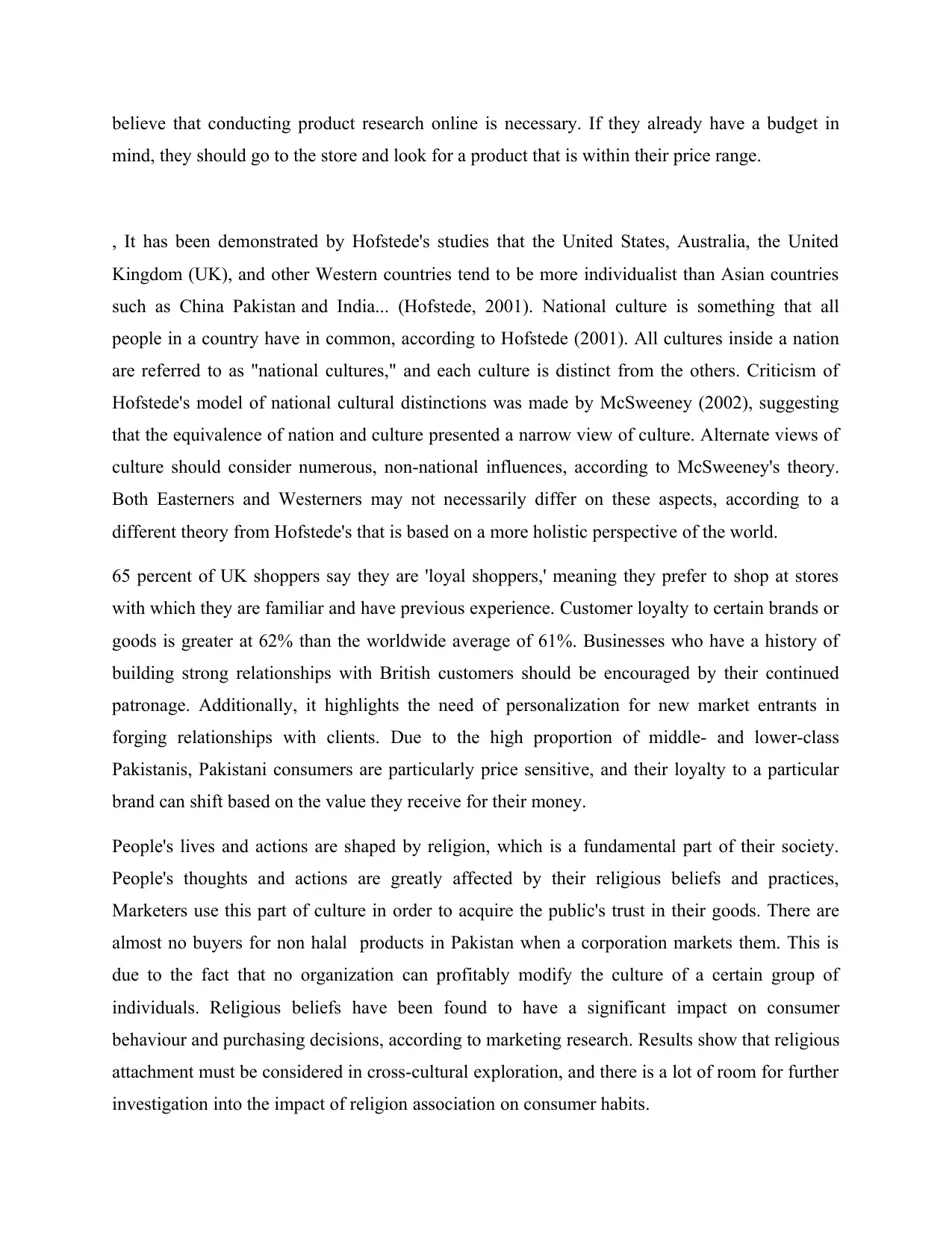
believe that conducting product research online is necessary. If they already have a budget in
mind, they should go to the store and look for a product that is within their price range.
, It has been demonstrated by Hofstede's studies that the United States, Australia, the United
Kingdom (UK), and other Western countries tend to be more individualist than Asian countries
such as China Pakistan and India... (Hofstede, 2001). National culture is something that all
people in a country have in common, according to Hofstede (2001). All cultures inside a nation
are referred to as "national cultures," and each culture is distinct from the others. Criticism of
Hofstede's model of national cultural distinctions was made by McSweeney (2002), suggesting
that the equivalence of nation and culture presented a narrow view of culture. Alternate views of
culture should consider numerous, non-national influences, according to McSweeney's theory.
Both Easterners and Westerners may not necessarily differ on these aspects, according to a
different theory from Hofstede's that is based on a more holistic perspective of the world.
65 percent of UK shoppers say they are 'loyal shoppers,' meaning they prefer to shop at stores
with which they are familiar and have previous experience. Customer loyalty to certain brands or
goods is greater at 62% than the worldwide average of 61%. Businesses who have a history of
building strong relationships with British customers should be encouraged by their continued
patronage. Additionally, it highlights the need of personalization for new market entrants in
forging relationships with clients. Due to the high proportion of middle- and lower-class
Pakistanis, Pakistani consumers are particularly price sensitive, and their loyalty to a particular
brand can shift based on the value they receive for their money.
People's lives and actions are shaped by religion, which is a fundamental part of their society.
People's thoughts and actions are greatly affected by their religious beliefs and practices,
Marketers use this part of culture in order to acquire the public's trust in their goods. There are
almost no buyers for non halal products in Pakistan when a corporation markets them. This is
due to the fact that no organization can profitably modify the culture of a certain group of
individuals. Religious beliefs have been found to have a significant impact on consumer
behaviour and purchasing decisions, according to marketing research. Results show that religious
attachment must be considered in cross-cultural exploration, and there is a lot of room for further
investigation into the impact of religion association on consumer habits.
mind, they should go to the store and look for a product that is within their price range.
, It has been demonstrated by Hofstede's studies that the United States, Australia, the United
Kingdom (UK), and other Western countries tend to be more individualist than Asian countries
such as China Pakistan and India... (Hofstede, 2001). National culture is something that all
people in a country have in common, according to Hofstede (2001). All cultures inside a nation
are referred to as "national cultures," and each culture is distinct from the others. Criticism of
Hofstede's model of national cultural distinctions was made by McSweeney (2002), suggesting
that the equivalence of nation and culture presented a narrow view of culture. Alternate views of
culture should consider numerous, non-national influences, according to McSweeney's theory.
Both Easterners and Westerners may not necessarily differ on these aspects, according to a
different theory from Hofstede's that is based on a more holistic perspective of the world.
65 percent of UK shoppers say they are 'loyal shoppers,' meaning they prefer to shop at stores
with which they are familiar and have previous experience. Customer loyalty to certain brands or
goods is greater at 62% than the worldwide average of 61%. Businesses who have a history of
building strong relationships with British customers should be encouraged by their continued
patronage. Additionally, it highlights the need of personalization for new market entrants in
forging relationships with clients. Due to the high proportion of middle- and lower-class
Pakistanis, Pakistani consumers are particularly price sensitive, and their loyalty to a particular
brand can shift based on the value they receive for their money.
People's lives and actions are shaped by religion, which is a fundamental part of their society.
People's thoughts and actions are greatly affected by their religious beliefs and practices,
Marketers use this part of culture in order to acquire the public's trust in their goods. There are
almost no buyers for non halal products in Pakistan when a corporation markets them. This is
due to the fact that no organization can profitably modify the culture of a certain group of
individuals. Religious beliefs have been found to have a significant impact on consumer
behaviour and purchasing decisions, according to marketing research. Results show that religious
attachment must be considered in cross-cultural exploration, and there is a lot of room for further
investigation into the impact of religion association on consumer habits.
Paraphrase This Document
Need a fresh take? Get an instant paraphrase of this document with our AI Paraphraser
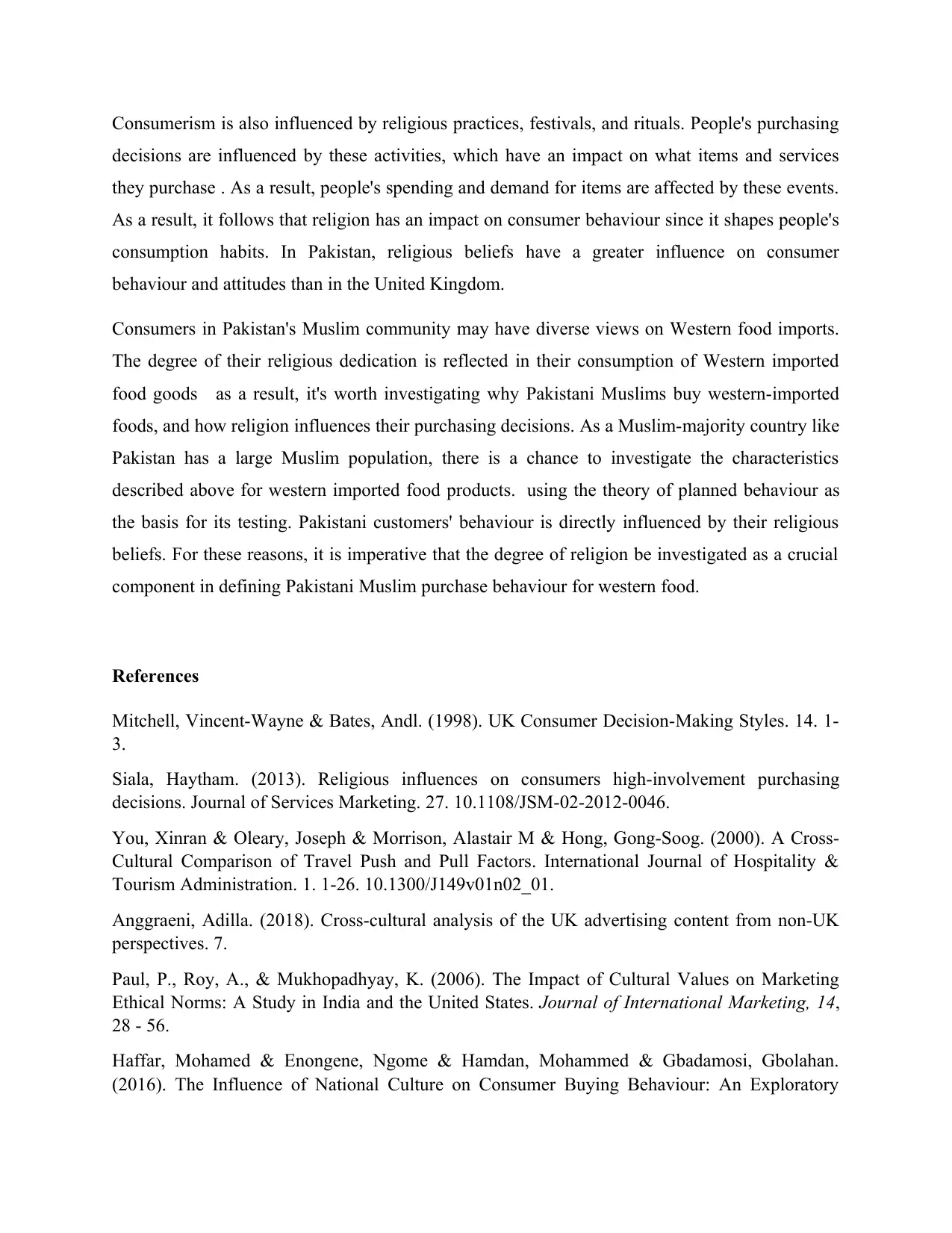
Consumerism is also influenced by religious practices, festivals, and rituals. People's purchasing
decisions are influenced by these activities, which have an impact on what items and services
they purchase . As a result, people's spending and demand for items are affected by these events.
As a result, it follows that religion has an impact on consumer behaviour since it shapes people's
consumption habits. In Pakistan, religious beliefs have a greater influence on consumer
behaviour and attitudes than in the United Kingdom.
Consumers in Pakistan's Muslim community may have diverse views on Western food imports.
The degree of their religious dedication is reflected in their consumption of Western imported
food goods as a result, it's worth investigating why Pakistani Muslims buy western-imported
foods, and how religion influences their purchasing decisions. As a Muslim-majority country like
Pakistan has a large Muslim population, there is a chance to investigate the characteristics
described above for western imported food products. using the theory of planned behaviour as
the basis for its testing. Pakistani customers' behaviour is directly influenced by their religious
beliefs. For these reasons, it is imperative that the degree of religion be investigated as a crucial
component in defining Pakistani Muslim purchase behaviour for western food.
References
Mitchell, Vincent-Wayne & Bates, Andl. (1998). UK Consumer Decision-Making Styles. 14. 1-
3.
Siala, Haytham. (2013). Religious influences on consumers high-involvement purchasing
decisions. Journal of Services Marketing. 27. 10.1108/JSM-02-2012-0046.
You, Xinran & Oleary, Joseph & Morrison, Alastair M & Hong, Gong-Soog. (2000). A Cross-
Cultural Comparison of Travel Push and Pull Factors. International Journal of Hospitality &
Tourism Administration. 1. 1-26. 10.1300/J149v01n02_01.
Anggraeni, Adilla. (2018). Cross-cultural analysis of the UK advertising content from non-UK
perspectives. 7.
Paul, P., Roy, A., & Mukhopadhyay, K. (2006). The Impact of Cultural Values on Marketing
Ethical Norms: A Study in India and the United States. Journal of International Marketing, 14,
28 - 56.
Haffar, Mohamed & Enongene, Ngome & Hamdan, Mohammed & Gbadamosi, Gbolahan.
(2016). The Influence of National Culture on Consumer Buying Behaviour: An Exploratory
decisions are influenced by these activities, which have an impact on what items and services
they purchase . As a result, people's spending and demand for items are affected by these events.
As a result, it follows that religion has an impact on consumer behaviour since it shapes people's
consumption habits. In Pakistan, religious beliefs have a greater influence on consumer
behaviour and attitudes than in the United Kingdom.
Consumers in Pakistan's Muslim community may have diverse views on Western food imports.
The degree of their religious dedication is reflected in their consumption of Western imported
food goods as a result, it's worth investigating why Pakistani Muslims buy western-imported
foods, and how religion influences their purchasing decisions. As a Muslim-majority country like
Pakistan has a large Muslim population, there is a chance to investigate the characteristics
described above for western imported food products. using the theory of planned behaviour as
the basis for its testing. Pakistani customers' behaviour is directly influenced by their religious
beliefs. For these reasons, it is imperative that the degree of religion be investigated as a crucial
component in defining Pakistani Muslim purchase behaviour for western food.
References
Mitchell, Vincent-Wayne & Bates, Andl. (1998). UK Consumer Decision-Making Styles. 14. 1-
3.
Siala, Haytham. (2013). Religious influences on consumers high-involvement purchasing
decisions. Journal of Services Marketing. 27. 10.1108/JSM-02-2012-0046.
You, Xinran & Oleary, Joseph & Morrison, Alastair M & Hong, Gong-Soog. (2000). A Cross-
Cultural Comparison of Travel Push and Pull Factors. International Journal of Hospitality &
Tourism Administration. 1. 1-26. 10.1300/J149v01n02_01.
Anggraeni, Adilla. (2018). Cross-cultural analysis of the UK advertising content from non-UK
perspectives. 7.
Paul, P., Roy, A., & Mukhopadhyay, K. (2006). The Impact of Cultural Values on Marketing
Ethical Norms: A Study in India and the United States. Journal of International Marketing, 14,
28 - 56.
Haffar, Mohamed & Enongene, Ngome & Hamdan, Mohammed & Gbadamosi, Gbolahan.
(2016). The Influence of National Culture on Consumer Buying Behaviour: An Exploratory
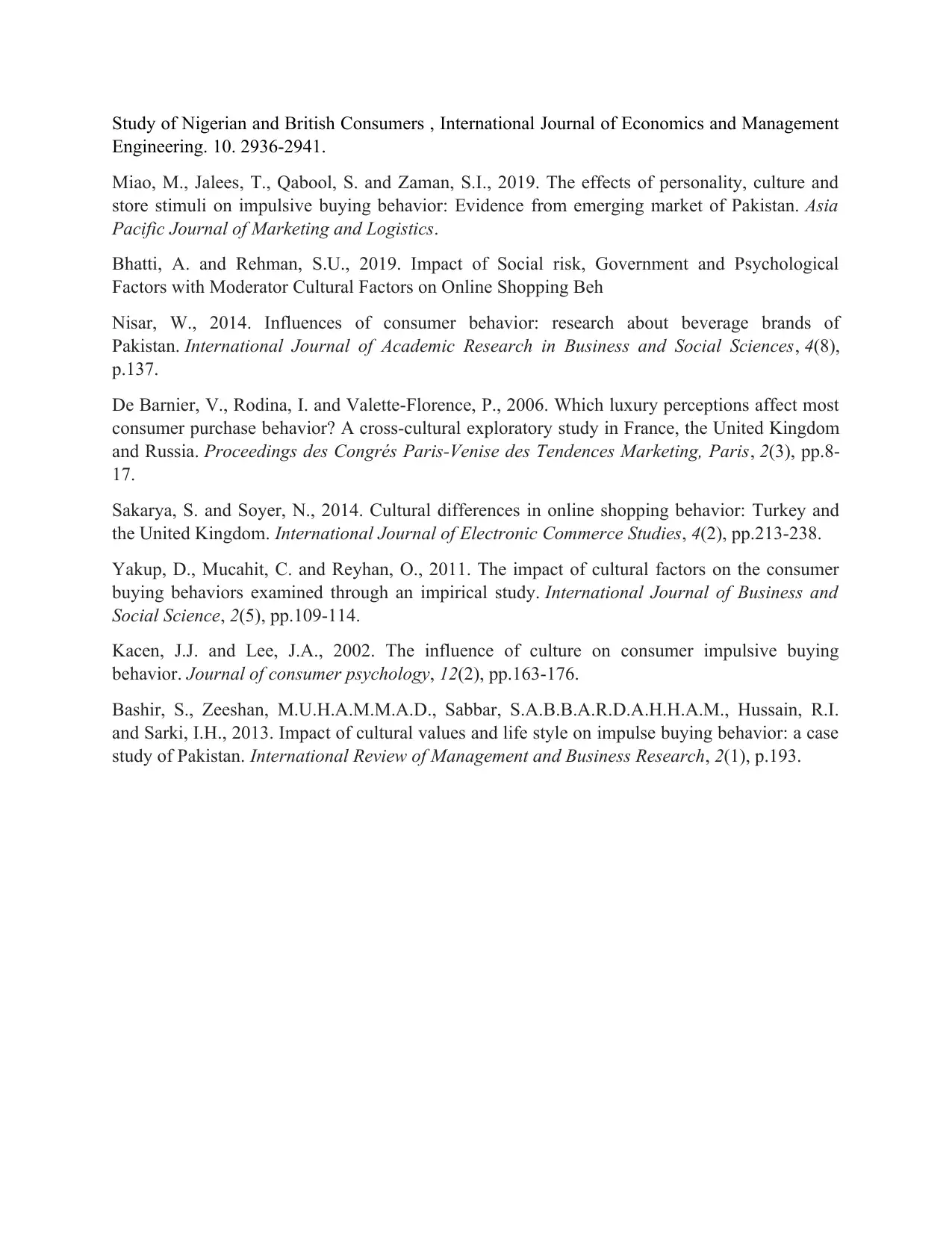
Study of Nigerian and British Consumers , International Journal of Economics and Management
Engineering. 10. 2936-2941.
Miao, M., Jalees, T., Qabool, S. and Zaman, S.I., 2019. The effects of personality, culture and
store stimuli on impulsive buying behavior: Evidence from emerging market of Pakistan. Asia
Pacific Journal of Marketing and Logistics.
Bhatti, A. and Rehman, S.U., 2019. Impact of Social risk, Government and Psychological
Factors with Moderator Cultural Factors on Online Shopping Beh
Nisar, W., 2014. Influences of consumer behavior: research about beverage brands of
Pakistan. International Journal of Academic Research in Business and Social Sciences, 4(8),
p.137.
De Barnier, V., Rodina, I. and Valette-Florence, P., 2006. Which luxury perceptions affect most
consumer purchase behavior? A cross-cultural exploratory study in France, the United Kingdom
and Russia. Proceedings des Congrés Paris-Venise des Tendences Marketing, Paris, 2(3), pp.8-
17.
Sakarya, S. and Soyer, N., 2014. Cultural differences in online shopping behavior: Turkey and
the United Kingdom. International Journal of Electronic Commerce Studies, 4(2), pp.213-238.
Yakup, D., Mucahit, C. and Reyhan, O., 2011. The impact of cultural factors on the consumer
buying behaviors examined through an impirical study. International Journal of Business and
Social Science, 2(5), pp.109-114.
Kacen, J.J. and Lee, J.A., 2002. The influence of culture on consumer impulsive buying
behavior. Journal of consumer psychology, 12(2), pp.163-176.
Bashir, S., Zeeshan, M.U.H.A.M.M.A.D., Sabbar, S.A.B.B.A.R.D.A.H.H.A.M., Hussain, R.I.
and Sarki, I.H., 2013. Impact of cultural values and life style on impulse buying behavior: a case
study of Pakistan. International Review of Management and Business Research, 2(1), p.193.
Engineering. 10. 2936-2941.
Miao, M., Jalees, T., Qabool, S. and Zaman, S.I., 2019. The effects of personality, culture and
store stimuli on impulsive buying behavior: Evidence from emerging market of Pakistan. Asia
Pacific Journal of Marketing and Logistics.
Bhatti, A. and Rehman, S.U., 2019. Impact of Social risk, Government and Psychological
Factors with Moderator Cultural Factors on Online Shopping Beh
Nisar, W., 2014. Influences of consumer behavior: research about beverage brands of
Pakistan. International Journal of Academic Research in Business and Social Sciences, 4(8),
p.137.
De Barnier, V., Rodina, I. and Valette-Florence, P., 2006. Which luxury perceptions affect most
consumer purchase behavior? A cross-cultural exploratory study in France, the United Kingdom
and Russia. Proceedings des Congrés Paris-Venise des Tendences Marketing, Paris, 2(3), pp.8-
17.
Sakarya, S. and Soyer, N., 2014. Cultural differences in online shopping behavior: Turkey and
the United Kingdom. International Journal of Electronic Commerce Studies, 4(2), pp.213-238.
Yakup, D., Mucahit, C. and Reyhan, O., 2011. The impact of cultural factors on the consumer
buying behaviors examined through an impirical study. International Journal of Business and
Social Science, 2(5), pp.109-114.
Kacen, J.J. and Lee, J.A., 2002. The influence of culture on consumer impulsive buying
behavior. Journal of consumer psychology, 12(2), pp.163-176.
Bashir, S., Zeeshan, M.U.H.A.M.M.A.D., Sabbar, S.A.B.B.A.R.D.A.H.H.A.M., Hussain, R.I.
and Sarki, I.H., 2013. Impact of cultural values and life style on impulse buying behavior: a case
study of Pakistan. International Review of Management and Business Research, 2(1), p.193.
⊘ This is a preview!⊘
Do you want full access?
Subscribe today to unlock all pages.

Trusted by 1+ million students worldwide
1 out of 9
Related Documents
Your All-in-One AI-Powered Toolkit for Academic Success.
+13062052269
info@desklib.com
Available 24*7 on WhatsApp / Email
![[object Object]](/_next/static/media/star-bottom.7253800d.svg)
Unlock your academic potential
Copyright © 2020–2026 A2Z Services. All Rights Reserved. Developed and managed by ZUCOL.





